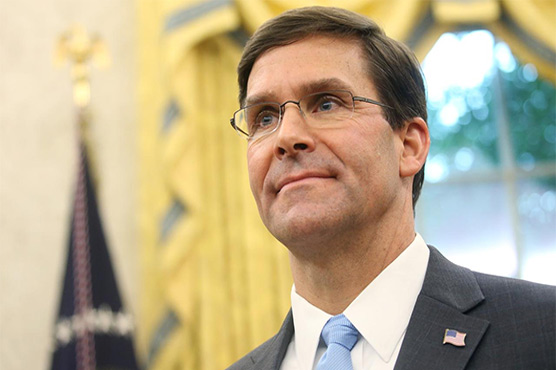US Defense Secretary Esper favors deploying intermediate-range missile in Asia

Mark's comments could add to an already tense relationship with China.
SYDNEY (Reuters/AFP) - U.S. Defense Secretary Mark Esper said on Saturday (August 03) that he was in favor of placing ground-launched, intermediate-range missiles in Asia relatively soon, a day after the United States withdrew from a landmark arms control treaty.
Esper’s comments are likely to raise concern about an arms race and could add to an already tense relationship with China.
"Yes, I would like to," Esper said, when asked whether he was considering placing such missiles in Asia.
"I would prefer months ... but these things tend to take longer than you expect," he told reporters traveling with him to Sydney when asked about a timeline for when the missiles could be deployed.
But Esper stressed the US was not embarking on a new arms race.
"The traditional sense of an arms race has been in a nuclear context," he said.
"Right now, we don’t have plans to build nuclear-tipped INF range weapons. It’s the Russians who have developed non-compliant likely, possibly nuclear-tipped weapons," he said.
"So I don’t see an arms race happening. I do see us taking corrective measures to develop a capability that we need for both the European theatre and this theatre, the Indo-Pac-Com theatre."
The United States formally left the Intermediate Nuclear Forces (INF) treaty with Russia on Friday after determining Moscow was violating the treaty, an accusation that the Kremlin has denied.
The 1987 pact banned ground-launched nuclear and conventional ground-launched ballistic and cruise missiles with ranges of 310 to 3,400 miles (500-5,500 km).
Reassure our allies
The INF treaty was considered a cornerstone of the global arms control architecture but the United States said the bilateral pact had given other countries -- namely China -- free rein to develop their own long-range missiles.
The rise of a militarily more assertive China in the region has worried traditional US allies such as Australia and New Zealand, and Beijing’s actions in the South China Sea have alarmed neighbours with competing territorial claims to the strategic waterway.
Esper did not specify where the US intended to deploy the weapons.
"I would not speculate because those things depend on plans, it’s those things you always discuss with your allies," he said.
Esper said he chose Asia for his first trip since taking office on July 23 "to affirm our commitment to the region, to reassure our allies and our partners."
The Pentagon chief and US Secretary of State Mike Pompeo are due to meet with their Australian counterparts on Sunday.
Washington withdrew from the INF treaty on Friday after accusing Russia of violating it for years.
Under the pact signed in 1987 by then US president Ronald Reagan and Soviet leader Mikhail Gorbachev, Washington and Moscow agreed to limit the use of conventional and nuclear medium-range missiles (with a range of 500-5,000 kilometres, 300-3,000 miles).
But its unravelling had been on the cards for months amid worsening ties between Russia and the US.

